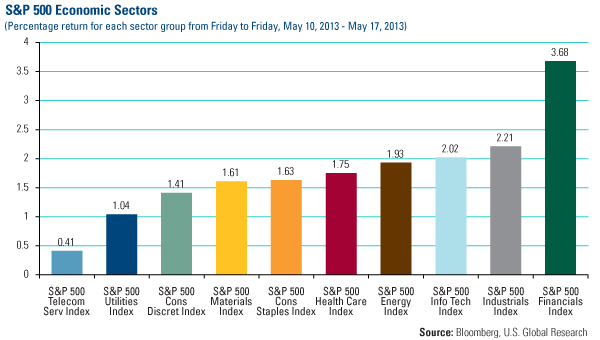U.S. Equity Market Radar (May 21, 2013)
The S&P 500 finished the week roughly 2 percent higher as market sentiment continues to improve. The S&P 500 ended the week at 1,666, which is exactly 1,000 points higher than the lows we hit in March 2009. The market continues to look across the valley and focuses on the growth potential in the second half of the year and into 2014.
Strengths
- The financials sector was the leader this week with broad based strength. The sector was led by the trust banks such as State Street Corp, Bank of New York Mellon and Northern Trust. Bellwether names in the sector also had a strong showing such as JP Morgan Chase, Goldman Sachs and Citigroup.
- The industrial sector was runner up and also a strong performer this week with the defense and aircraft related names rallying such as Boeing, Northrop Grumman and Lockheed Martin.
- Cisco Systems was the best performer this week rising by nearly 15 percent. The company reported better than expected earnings as margins improved and the company gave encouraging comments regarding the near-term outlook.
Weaknesses
- The telecommunication services sector was the worst performer this week as the market is in “risk-on” mode and lower beta areas of the market have lagged.
- The utilities sector also under performed but still rose by more than one percent.
- Cliffs Natural Resources was the worst performer in the S&P 500 this week declining 12.07 percent on weak iron ore prices and giving back much of last week’s 18 percent gain.
Opportunity
- The market continues to climb that proverbial wall of worry and just shakes off any bad news and rallies smartly on good news.
- Global central banks are literally pulling out all the stops in an attempt to ignite economic growth. The European Central Bank (ECB) cut interest rates last week, which is a move in the right direction as far as the market is concerned.
Threat
- A market consolidation wouldn’t be a surprise after a strong start to the year.
- Expectations for cyclical areas of the market are low and allowing stocks to rally when companies just meet expectations. If the global economy were to deteriorate the market wouldn’t have much to fall back on.












